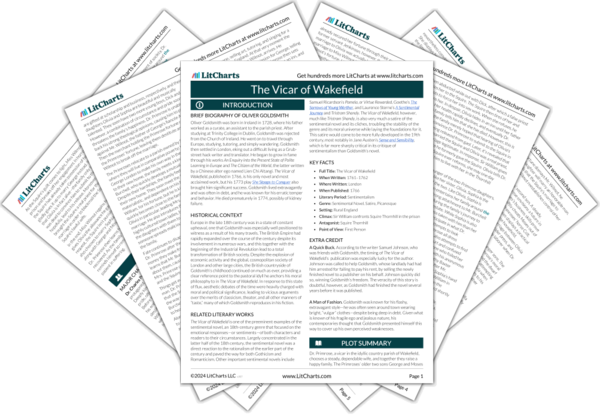Mr. Wilmot Quotes in The Vicar of Wakefield
‘Well,’ returned I, ‘if what you tell me be true, and if I am to be a beggar, it shall never make me a rascal, or induce me to disavow my principles. I’ll go this moment and inform the company of my circumstances; and as for the argument, I even here retract my former concessions in the old gentleman’s favour, nor will I allow him now to be an husband in any sense of the expression.’
‘I must confess, Sir,’ cried he, ‘that your present disappointment does not entirely displease me. Your immoderate passion for wealth is now justly punished. But tho’ the young lady cannot be rich, she has still a competence sufficient to give content. Here you see an honest young solider, who is willing to take her without fortune; they have long loved each other, and for the friendship I bear his father, my interest shall not be wanting in his promotion. Leave then that ambition which disappoints you, and for once admit that happiness which courts your acceptance.’

Mr. Wilmot Quotes in The Vicar of Wakefield
‘Well,’ returned I, ‘if what you tell me be true, and if I am to be a beggar, it shall never make me a rascal, or induce me to disavow my principles. I’ll go this moment and inform the company of my circumstances; and as for the argument, I even here retract my former concessions in the old gentleman’s favour, nor will I allow him now to be an husband in any sense of the expression.’
‘I must confess, Sir,’ cried he, ‘that your present disappointment does not entirely displease me. Your immoderate passion for wealth is now justly punished. But tho’ the young lady cannot be rich, she has still a competence sufficient to give content. Here you see an honest young solider, who is willing to take her without fortune; they have long loved each other, and for the friendship I bear his father, my interest shall not be wanting in his promotion. Leave then that ambition which disappoints you, and for once admit that happiness which courts your acceptance.’













